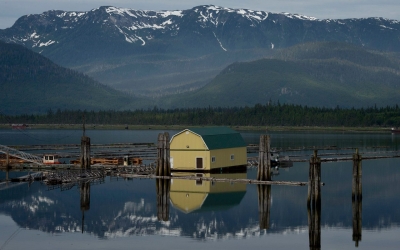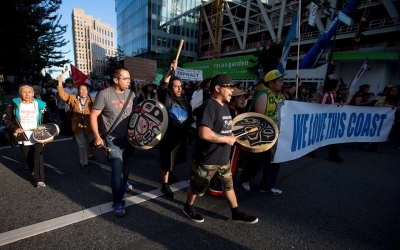Canada's indigenous: 'We are the wall' that the pipeline cannot pass
Canadian aboriginal groups plan lawsuits and direct actions to prevent the completion of the Northern Gateway pipeline
Canada's indigenous: 'We are the wall' that the pipeline cannot passCanadian aboriginal groups plan lawsuits and direct actions to prevent the completion of the Northern Gateway pipeline First Nations groups have vowed to fight the Canadian government’s approval of a planned pipeline with lawsuits and direct action. They say Tuesday’s decision violates their constitutional rights because the government failed to consult tribal bands, the basic units of government for First Nations in Canada. “The government has moved their legal responsibility to consult with First Nations to Enbridge, and that’s a wrong move on their part,” said Grand Chief Edward John of the Tl'azt'en Nation. Enbridge is the Canadian energy company behind the planned Northern Gateway pipeline. The Canadian government has a legal duty, according to the constitution, to consult with the First Nations and to accommodate aboriginal treaties in decisions that may impact First Nations lands and resources. Enbridge’s Northern Gateway — a 730-mile, $7 billion pipeline — would carry tar sands oil from the province of Alberta to the coastal town of Kitimat, British Columbia, where the oil will be loaded onto tankers and transported along the coastlines. Agreements were made with 60 percent of the aboriginal population along the proposed route of the pipeline, Enbridge spokesman Ivan Giesbrecht said in an emailed statement. Part of the line runs through the neighboring province of Alberta. "That said, we have acknowledge we have more work to do with some First Nations," Giesbrecht added. 
But many indigenous groups in British Columbia said they oppose the pipeline because it would pose risks to the environment that provides their livelihoods. They are particularly worried about spills, as the pipeline would carry tar sands oil — a product they say is especially toxic. Tar sands oil also sinks, rather than floating like crude oil, making a spill more difficult and costly to clean up. “Currently, we have no pipelines, no oil, no bitumen in B.C. (British Columbia),” John said, adding that the dangers to their environment come with little benefit to residents. Bitumen is a term for a heavy, viscous type of oil. John Bennet, national program director for Sierra Club Canada, said, “I’ve been doing this for 30 years now, and I’ve never see such strength and opposition to a project." Umbrella organizations for British Columbia’s indigenous groups — Union of B.C. Indian Chiefs, First Nations Summit and B.C. Assembly of First Nations — said in a news release Tuesday that they “unequivocally reject” Prime Minister Stephen Harper’s decision to approve the pipeline. “Enbridge’s Northern Gateway tanker and pipeline project exposes all communities from Alberta to the Pacific Coast to the undeniable risk of pipeline and supertanker oil spills,” the organizations said in the release. “This project poses an unacceptable risk to the environment, the health, the safety, and livelihoods of all peoples throughout this province.” 'We are the wall'Five separate lawsuits are being filed to challenge the findings of a government joint review panel (JRP) report meant to assess the pros and cons of the project. The JRP gave approval to the pipeline last December. Hundreds of prominent scientists signed a letter to Canada's prime minister blasting the joint review panel report, which they said contained so many errors and omissions that it could not be used to gauge whether or not the pipeline was in the public's best interest. “Our position is that before a decision can be made, there has to be a complete report in accordance with the law — and the report was flawed, so the government cannot legally make the decision,” said Barry Robinson, staff lawyer for EcoJustice, which launched a lawsuit in January. “If the courts find we are correct, then the decision made yesterday would have to be reversed.” Giesbrecht, of Enbridge, said after the JRP recommendation the company committed to re-engaging First Nations. "Northern Gateway will continue to build trust and support in Aboriginal communities," he said. "We are focused on the task ahead, reaching out to Aboriginal communities that we haven't been able to engage in discussions to this point." The rights of First Nations who oppose the pipeline will pose a formidable barrier to the project, lawyers for the Lake Babine First Nation — one of the largest indigenous groups along the pipeline’s proposed route — said Tuesday in a news release. The court process will involve a review of aboriginal culture and potentially affected species. 
First Nations groups and environmentalists behind the legal challenges said the process could stall the pipeline for years. Enbridge President Al Monaco told the Canadian press that his company would consult with indigenous groups opposed to the pipeline and is prepared for “the eventuality” of legal challenges. “Our advice is that this is not necessarily an endless process, as some are suggesting. There is a definitive process for Federal Court matter so I think there is a definitive timeline. This won’t go on forever in terms of endless legal battles,” Monaco said. If legal challenges do not derail the project, First Nations in B.C. have promised direct action, promising that, despite Harper’s approval, the pipeline would never be built. “We are the wall that Enbridge and Harper cannot pass,” chief of the Carrier Sekani Tribal Council Terry Teegee said in a news release Tuesday. Grand Chief Stewart Philip of the Union of B.C. Indian Chiefs told Al Jazeera that if Enbridge attempts to break ground on the pipeline, “We will take whatever measures are necessary to prevent that from happening.” “Our coastline is not for sale to big oil, no matter how much money is on the table. There are thousands of British Columbians and Canadians who feel the same way, and who will stand with us to stop this dangerous project,” the Heiltsuk First Nation said in a news release Tuesday. More than 1,000 people staged an impromptu rally Tuesday against the approval decision in front of news agency CBC Canada in Vancouver. Recent polls have shown that the majority of British Columbia residents do not support the pipeline, with three-quarters of respondents opposing it. “They’re opposed because tens of thousands of B.C. residents and First Nations make their living through a sustainable economy, tourism, fishing and hunting — all of which are threatened by the presence of a major oil project,” Bennet said. © 2014 Al Jazeera America, LLC. All rights reserved. http://america.aljazeera.com/articles/2014/6/18/northern-gatewayindigenous.html |